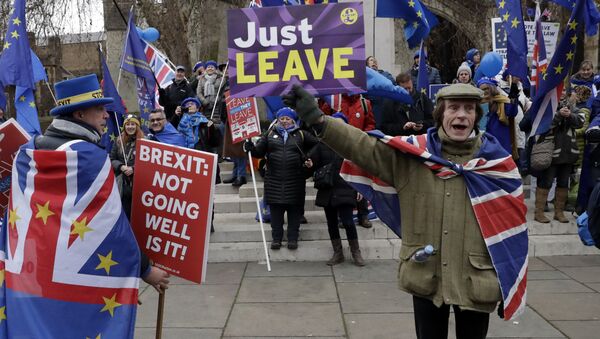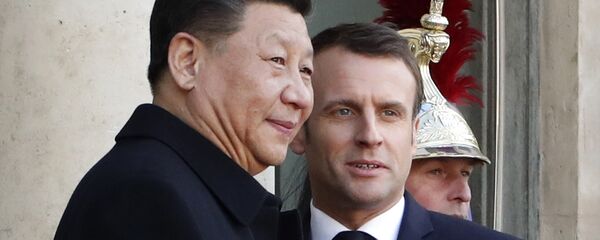President Emmanuel Macron's statement has prompted speculation that the French president may facilitate a British no-deal withdrawal from the bloc.
"A long extension, implying the UK takes part in European elections and European institutions, has nothing easy or automatic about it", Macron said on 2 April, during talks with Irish Prime Minister Leo Varadkar. "Our priority must be the good functioning of the EU and the single market. The EU can't be held hostage long-term by the resolution of a political crisis in the UK".
The Guardian opined that Macron's remarks suggested that he might "veto… extended British membership of the EU at the Brussels summit on 10 April".
On 3 April, the House of Commons passed a bill requiring the UK government to request another extension to the Brexit process by 313 votes to 312. Previously, the EU postponed the UK's departure from 29 March to 12 April, when a no-deal Brexit could take place.
'No-Deal Outcome Clearly Not in Anyone's Interests'
Commenting on the French president's rationale behind the tough statement, Rita Trehan, the CEO of Dare Worldwide, best-selling author and prominent Brexit adviser, pointed out that "the 'political crisis' referred to by Emmanuel Macron is entirely of the UK's making".
"Understandably, Irish Taoiseach [PM] Leo Varadkar needs reassurance that there will be no hard border on the island, or Ireland, after Brexit; while EU leaders are not prepared to compromise on the fundamental principles on which the Union was founded", she noted.
"That implies that a compromise must be reached", she stressed. "But European leaders, including Mr Macron, believe they have met Theresa May more than halfway during the negotiation process, and that is understandable".
Having said this, Trehan suggested that "Macron's strongman rhetoric may have been calculated, in part, to appease French voters, who are widely disgruntled with his presidency to date".
The French president is struggling to raise his approval ratings ahead of the European Parliament elections scheduled for 26 May. Macron's presidential ratings are fluctuating around the 30 percent mark amid yellow vests' protests in France.
Macron's Remarks 'Entirely Typical of His Arrogance'
For his part, Professor Emeritus Sir Thomas M. Devine at the University of Edinburgh highlighted that "this statement is entirely typical of the arrogance of Macron".
"He seems to have forgotten three key points: first, his country is steadily becoming one of the most indebted in the EU; second, the streets of Paris are often still aflame with opposition to some of his policies; third, the blood of many British soldiers was spilt ending the tyrannical rule of Nazi occupation in France after its ignominious defeat in 1940. Gratitude rather than sniping criticism against the UK would therefore be in order", the professor emphasised.
"What Macron fears most is a People's Vote in the UK resulting in a cancellation of Brexit. With the UK then confirmed again as a formidable member of the EU, his grandiose plans for a federal Europe will swiftly disintegrate into ruins", Devine stressed, in an apparent reference to the French president's 4 March open letter eloquently entitled "For European renewal".
While the British Parliament is trying to prevent a potentially chaotic no-deal Brexit on 12 April, EU Commission President Jean-Claude Juncker rejected Prime Minister Theresa May's appeal for yet another short extension in order to find ways to pass the withdrawal agreement with the Labour Party's assistance.
"12 April is the ultimate deadline for the approval of the withdrawal agreement by the House of Commons", Juncker said. "If it has not done so by then, no further short extension will be possible. After 12 April, we risk jeopardising the European Parliament elections, and so threaten the functioning of the European Union", Juncker told the European Parliament in Brussels.
After rejecting Theresa May's version of the Brexit deal, British MPs have repeatedly failed to reach a compromise on eight and then four alternative options to the prime minister's agreement, on 27 March and 2 April respectively, thus paving the way for a potential no-deal exit.
The views and opinions expressed by the speakers do not necessarily reflect those of Sputnik.





